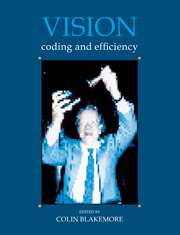Book contents
- Frontmatter
- Contents
- List of Contributors
- Preface
- Reply
- Acknowledgements
- Concepts of coding and efficiency
- Efficiency of the visual pathway
- Colour
- Brightness, adaptation and contrast
- Development of vision
- 19 On reformation of visual projection: cellular and molecular aspects
- 20 Retinal pathways and the developmental basis of binocular vision
- 21 Development of visual callosal connections
- 22 Sensitive periods in visual development: insights gained from studies of recovery of visual function in cats following early monocular deprivation or cortical lesions
- 23 The developmental course of cortical processing streams in the human infant
- 24 Maturation of mechanisms for efficient spatial vision
- 25 The puzzle of amblyopia
- Depth and texture
- Motion
- From image to object
- Index
22 - Sensitive periods in visual development: insights gained from studies of recovery of visual function in cats following early monocular deprivation or cortical lesions
Published online by Cambridge University Press: 05 May 2010
- Frontmatter
- Contents
- List of Contributors
- Preface
- Reply
- Acknowledgements
- Concepts of coding and efficiency
- Efficiency of the visual pathway
- Colour
- Brightness, adaptation and contrast
- Development of vision
- 19 On reformation of visual projection: cellular and molecular aspects
- 20 Retinal pathways and the developmental basis of binocular vision
- 21 Development of visual callosal connections
- 22 Sensitive periods in visual development: insights gained from studies of recovery of visual function in cats following early monocular deprivation or cortical lesions
- 23 The developmental course of cortical processing streams in the human infant
- 24 Maturation of mechanisms for efficient spatial vision
- 25 The puzzle of amblyopia
- Depth and texture
- Motion
- From image to object
- Index
Summary
On the basis of clinical experience with treatment of amblyopia, it had been long been suspected that the central visual pathways possessed a degree of plasticity in early life that did not exist in adulthood (Duke-Elder & Wybar, 1973). The first insight into the site and nature of this plasticity was obtained by Wiesel & Hubel (1963) in their pioneering study of the effects of early monocular deprivation on the kitten visual cortex. Whereas periods of deprivation imposed in the first months of life caused very substantial shifts of ocular dominance of cortical cells towards the nondeprived eye, similar periods of deprivation imposed on adult cats caused no measurable changes of ocular dominance. The time course of the sensitive period for the effects of monocular deprivation was documented more precisely in subsequent investigations that examined in a more systematic fashion the effects of short periods of deprivation imposed on both cats (Hubel & Wiesel, 1970; Olson & Freeman, 1980; Cynader, Timney & Mitchell, 1980; Jones, Spear & Tong, 1984) and monkeys (e.g. Hubel, Wiesel & LeVay, 1977; Blakemore, Garey & Vital-Durand, 1978; Von Noorden & Crawford, 1979; LeVay, Wiesel & Hubel, 1980) of different ages. While there is general consensus that the visual cortex of the cat is most sensitive to monocular deprivation during the fourth week of postnatal life, there is substantial disagreement concerning the rate of decline of susceptibility beyond this point.
- Type
- Chapter
- Information
- VisionCoding and Efficiency, pp. 234 - 246Publisher: Cambridge University PressPrint publication year: 1991



